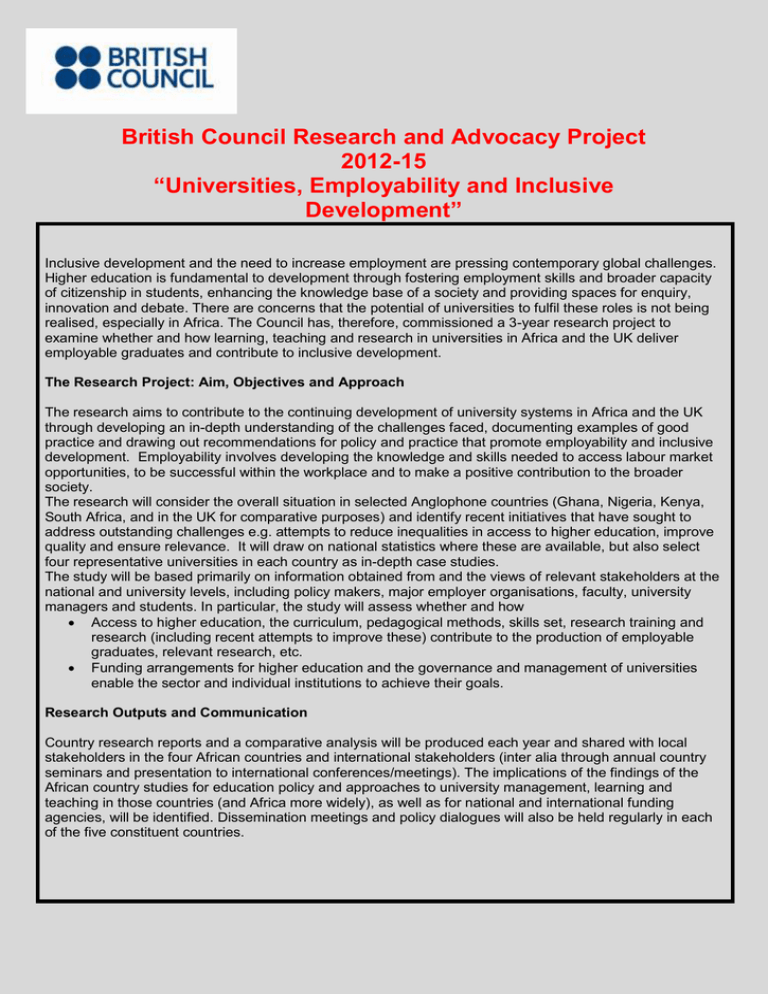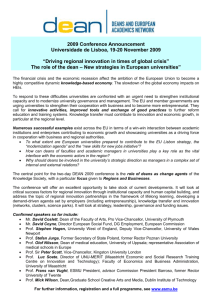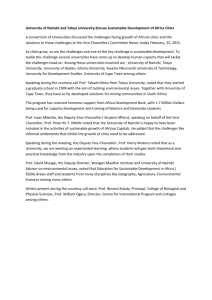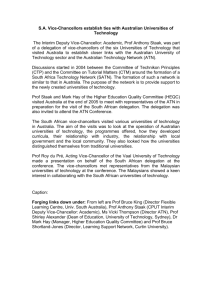project_2014_summary
advertisement

British Council Research and Advocacy Project 2012-15 “Universities, Employability and Inclusive Development” Inclusive development and the need to increase employment are pressing contemporary global challenges. Higher education is fundamental to development through fostering employment skills and broader capacity of citizenship in students, enhancing the knowledge base of a society and providing spaces for enquiry, innovation and debate. There are concerns that the potential of universities to fulfil these roles is not being realised, especially in Africa. The Council has, therefore, commissioned a 3-year research project to examine whether and how learning, teaching and research in universities in Africa and the UK deliver employable graduates and contribute to inclusive development. The Research Project: Aim, Objectives and Approach The research aims to contribute to the continuing development of university systems in Africa and the UK through developing an in-depth understanding of the challenges faced, documenting examples of good practice and drawing out recommendations for policy and practice that promote employability and inclusive development. Employability involves developing the knowledge and skills needed to access labour market opportunities, to be successful within the workplace and to make a positive contribution to the broader society. The research will consider the overall situation in selected Anglophone countries (Ghana, Nigeria, Kenya, South Africa, and in the UK for comparative purposes) and identify recent initiatives that have sought to address outstanding challenges e.g. attempts to reduce inequalities in access to higher education, improve quality and ensure relevance. It will draw on national statistics where these are available, but also select four representative universities in each country as in-depth case studies. The study will be based primarily on information obtained from and the views of relevant stakeholders at the national and university levels, including policy makers, major employer organisations, faculty, university managers and students. In particular, the study will assess whether and how Access to higher education, the curriculum, pedagogical methods, skills set, research training and research (including recent attempts to improve these) contribute to the production of employable graduates, relevant research, etc. Funding arrangements for higher education and the governance and management of universities enable the sector and individual institutions to achieve their goals. Research Outputs and Communication Country research reports and a comparative analysis will be produced each year and shared with local stakeholders in the four African countries and international stakeholders (inter alia through annual country seminars and presentation to international conferences/meetings). The implications of the findings of the African country studies for education policy and approaches to university management, learning and teaching in those countries (and Africa more widely), as well as for national and international funding agencies, will be identified. Dissemination meetings and policy dialogues will also be held regularly in each of the five constituent countries. The Research Team The project as a whole is coordinated by the British Council office in Nairobi. The research team is led by Dr Tristan McCowan of the Institute of Education, University of London and supported by Amy Smail (research officer) and Dr Moses Oketch (project advisor). The IoE team will undertake the research in the UK and is working with teams in each of the four African countries, supported by the British Council office in each: Ghana: Dr Eric Ananga, University of Education, Winneba Nigeria: Dr Segun Adedeji, University of Ibadan, and Dr Stephen Oyebade, University of Lagos Kenya: Dr Ibrahim Oanda and Prof Daniel Sifuna, Kenyatta University South Africa: Prof Melanie Walker, University of the Free State External Advisory Group The project is advised by an external advisory group with experience in university education, management and research, comprised of Prof Esther Sakyi-Dawson, University of Ghana Prof Olufemi Bamiro, University of Ibadan, Nigeria Prof Judith Bahemuka, University of Nairobi, Kenya Prof Gerald Ouma, University of Pretoria, South Africa Prof Carole Rakodi, University of Birmingham, UK Its role is to Advise on the selection of case study universities Advise on methodology and provide feedback on draft reports and Assist the country teams to develop networks of stakeholders for the purposes of undertaking the study and research communication. UK The main purpose of the UK study is to provide a comparative dimension – in showing how universities have responded to the common challenge of graduate employability. Analysis of overall trends in the country, as well as targeted research of innovations and best practice relating to promotion of employability will be carried out to inform the study as a whole. In addition, there will be a strand of research relating to university partnerships. The research will explore the factors that underpin successful partnerships between institutions in the UK and those in the four subSaharan African countries, drawing on expert interviews and case studies of partnerships in each of the countries. The anticipated audiences for findings from the comparative analysis in the UK include Those in the university sector concerned with university education in Africa (e.g. recruitment of students and researchers, as research partners, collaborative programme design and delivery) International organisations based in the UK e.g. the Commonwealth Scholarships Commission, the Association of Commonwealth Universities Bilateral and multilateral agencies e.g. DFID, the World Bank.









